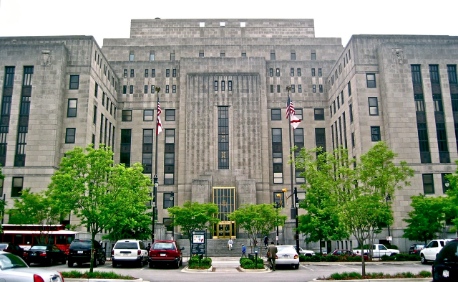Do you have any idea what you pay for sewer service? Most people pay so little that they’re no more conscious of the cost than they are of a cup of cheap coffee. That’s the way it used to be in the county where I live, but widespread corruption on sewer construction and bond deals sent rates through the roof. That corruption has now resulted in the largest municipal bankruptcy filing in U.S. history.
Not that many years ago, my sewer bill was only about $10 for each quarter of the year. When the price started rising, billing became monthly. My most recent bill was $20.18. Current rates are now almost 10 times what they were in 1992. Something that used to cost almost nothing is getting a bit expensive. If my bill is anywhere close to typical for one person living alone, the cost could add up quickly for a family of four or five. That extra bill hits many families hard in this economy, especially as local taxes continue to go up.
National stories about the bankruptcy filing today have been all about the huge amounts of money involved and the fight between the Jefferson County Commission and the NYC banks over cutting a deal to avoid bankruptcy. Most of the stories I’ve seen, though, skip lightly over the most important point. They pretty much ignore the issue of why this mess ever got this bad. I worked in the middle of the politics of the situation, so I can give you some insight into that.
In 1993, a lawsuit was filed against the county alleging that the sewer system was allowing sewage to spill over into a small river during times of heavy rains. That river is important because it’s a source of drinking water for the region. Three years later, the county suddenly settled with the plaintiffs by entering into an agreement to spend a lot of money to fix the alleged problems. (I assume the problems were real, but I don’t know enough about it to have a firm opinion about that.)
On the surface, it seemed like a fair deal that was good for everyone. What we didn’t know at the time was the some county politicians saw the requirement to spend money as a way to suck money out of the system — and blame it on someone else. The corruption was bi-partisan. There were 22 people eventually convicted of charges related to the sewer corruption, and there’s no telling how many others weren’t caught. Among the convicted were white Republican politicians and black Democratic politicians, in addition to employees and owners of engineering and construction companies. (For more about the construction portion of the scandal, see this page.)
 When local sewer bills started skyrocketing, the politicians had an easy answer. “It’s not us,” they said. “We’re only spending money because we have to. Those environmentalists made us do it.”
When local sewer bills started skyrocketing, the politicians had an easy answer. “It’s not us,” they said. “We’re only spending money because we have to. Those environmentalists made us do it.”
As they spent the money, politicians were cutting deals left and right to take kickbacks to funnel business to certain companies. Those of us working in local politics knew there was something going on a long time ago, even though we couldn’t prove much. There was a lot of talk and some evidence. I remember having a meeting with a reporter from the Birmingham News about 10 years ago with one of my clients. My client — who was running for a county position — laid out the case that there was major corruption going on involving the sewer. The reporter didn’t take it seriously, and he never did anything with the information or the documents we provided.
Even after the construction scandal was over, the corruption didn’t end. The county now had a multi-billion dollar debt. New York banks led by JP Morgan Chase talked the politicians into doing complex “bond swap” agreements that made millions of dollars for them — and the politicians got something out of it, too. Former Birmingham Mayor Larry Langford was one of the slickest young black politicians when he started in the game, and he hoped to become the state’s first black governor. (He had a lot of white support for his tough-talking social conservative attitudes about crime and teen-agers, among other things.) Before Langford was elected mayor, though, he was a member of the County Commission, and he was one of those politicians who got favors from the banks. Langford was still mayor of Birmingham when he was convicted of fraud and sent to prison, where he still is today.
 You can read more about the Securities and Exchange Commission investigation into the bond swaps and Langford’s trial here. If you really want to be entertained, though, read this great article from two years ago about his life and political career. It highlights the contradictions and personality flaws that are the hallmarks of many politicians.
You can read more about the Securities and Exchange Commission investigation into the bond swaps and Langford’s trial here. If you really want to be entertained, though, read this great article from two years ago about his life and political career. It highlights the contradictions and personality flaws that are the hallmarks of many politicians.
So here we are. A number of corrupt politicians and businessmen have been convicted of crimes related to the sewer, but it’s the people of the county who are left holding the bag. Because government operates as a monopoly, we don’t have any choice but to do business with the county or else move.
You can read national coverage of this story in all the usual places today, but I doubt any of them are going to let you know just how strongly this is a story about corruption, not just economic hard times. For instance, take a look at this Reuter’s story, which finally mentions the corruption and convictions in the 10th paragraph.
(As a side point, what’s the purpose of this sentence in the Reuter’s story: “Birmingham was the scene of one of the fiercest confrontations of the U.S. civil rights movement in 1963 when city leaders and police violently resisted a campaign for desegregation by demonstrators led by Martin Luther King Jr.” If the article had been about financial problems for Boston, would there have been a sentence about how white people rioted there and attacked blacks when busing was announced to achieve racial integration? Of course not, but some media people can’t mention Birmingham without turning it into a civil rights story.)
I don’t see any good guys in this story. There have certainly been some honest politicians in the past few years who’ve tried to fix the problem, but the financial hole was too deep. Mostly, it’s a cautionary tale of what happens when corrupt and incompetent people are given monopoly power to make decisions that affect close to a million people. (The Birmingham metro area has a million people, and Jefferson County is home to the biggest group of them.)
The individuals involved were certainly corrupt and many of them were incompetent, but it’s the system that’s ultimately to blame. If this had been a business in a free market, the sewer system wouldn’t have been able to bleed customers, because they would have had other choices. And if it had been a private company, the company could fail and go out of business — leaving the banks to take responsibility for their dishonest gambling deals.
The story that gets told is about corrupt, fallible people, but the real story is a monopolistic, coercive state. Until the coercion goes away, we’re going to keep giving corrupt people the power to run our lives.

 Little girl’s happy ending reminds us not to be defined by tragedy
Little girl’s happy ending reminds us not to be defined by tragedy We frequently go back to the past hoping to find a different future
We frequently go back to the past hoping to find a different future Goldwater led to Reagan Revolution; What might Ron Paul’s legacy be?
Goldwater led to Reagan Revolution; What might Ron Paul’s legacy be?